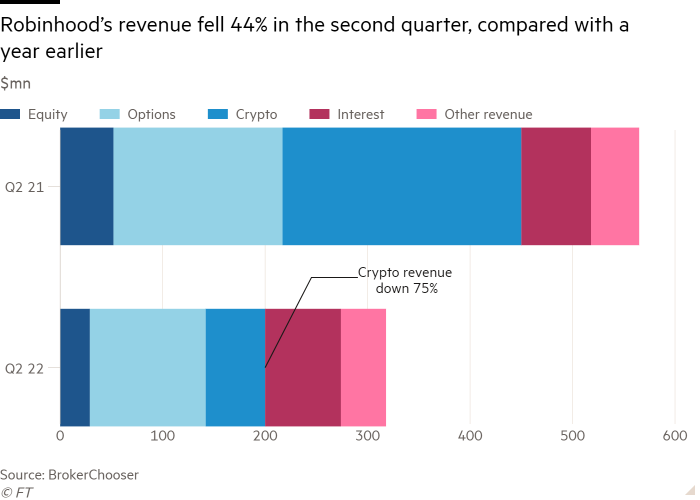
Robinhood, the retail broker whose growth skyrocketed as the stock market soared during the coronavirus pandemic, has come crashing back down to earth.
Active users have fled the platform. The number of funded accounts has stabilized. Robinhood’s market capitalization has fallen by two-thirds since it went public last summer. Last week it announced layoffs for nearly a quarter of its staff.
“It’s a post-Covid hangover,” said Dan Dolev, an analyst at Mizuho Securities. Robinhood “woke up in a Las Vegas hotel, and there’s a Bengal tiger in the bathroom.”
The California-based broker attracted a generation of first-time investors with commission-free trading and an easy-to-use app. But its expansion has hit a wall since the government’s pandemic stimulus payments ended, inflation began eating into investors’ budgets and the stock market fell from its highs.
Robinhood’s business has felt these challenges more acutely than other brokers. Its revenue in the second quarter was down 44% year over year, compared with an adjusted 10% increase at Interactive Brokers and a 13% increase at Charles Schwab. Schwab also posted record profits for the quarter.
After adding 10 million accounts in 2021, Robinhood only added 100,000 accounts in the second quarter. The number of active merchants on its platform decreased by almost 2 million from the previous quarter, to 14 million. A year earlier, active users totaled 21.3 million.
Part of Robinhood’s problem is demographic. The broker attracted younger customers who found themselves with cash to invest from their stimulus checks. When the final government payments were released in March 2021, Robinhood Snacks’ e-newsletter ran the headline “Stimulus has landed.”
“They are aimed at younger people, who benefited from ‘stimmy’. . . and who were spending it on dogecoin,” Dolev said, referring to the stimulus and the cryptocurrency.
But with inflation ravaging the economy, young customers have proven to be the most vulnerable to financial shocks.
“Traditional investors who invest for retirement have retired but not disappeared. Those lower-income, less-sophisticated clients are the ones who just left,” said Richard Repetto, an analyst who follows brokers and exchanges at Piper Sandler.
A portion of Robinhood’s clients bet on financial technology and cryptocurrency-related stocks that have been among the biggest decliners amid the fall in stock markets this year. The exposure means they have been hit harder than investors with broader portfolios.
While Schwab’s reported client assets fell 10 percent in the second quarter from a year earlier, Robinhood’s assets under custody fell 37 percent, from $102 billion to $64 billion. .
“Young people got crushed because they had all the stocks that got crushed, crypto stocks and fintech stocks,” Repetto said.

Robinhood has said its competitiveness will depend on bringing new products to market. But “frustrating” internal bureaucracy has made it slow to launch things like retirement accounts, said a staffer with direct knowledge of the matter.
Staff have left as morale deteriorates. Before the latest round of job cuts, Robinhood laid off 9% of its full-time workers in April. Since then, another 5% of staff have quit, according to Robinhood figures.
Most of Robinhood’s revenue is tied to the number of transactions that take place on its platform. As trading has declined in volatile assets like cryptocurrencies, so has this revenue stream.
In the second quarter of 2021, crypto trading accounted for half of Robinhood’s $451 million in transaction-based revenue. A year later, crypto trading brought in $58 million, which represented just 29 percent of transaction revenue that totaled $202 million.
“Where did Robinhood generate this atypical growth and trading volume? Lots of small crypto traders and lots of small crypto trades,” said Tom Sosnoff, co-founder of options trading platform Tastyworks. “The reason online brokers like Tasty, Interactive Brokers, Fidelity and Schwab haven’t had the same kind of reduction as Robinhood is that crypto is virtually none of our revenue, and virtually all of theirs.”
The Federal Reserve’s rise in interest rates has given brokers the opportunity to earn interest and investment income with money hidden in customers’ accounts.
recommended

But Robinhood is largely losing that benefit. Account balances there average about $4,500, compared to $352,764 at Schwab. For every 0.25 percentage point rate increase, Robinhood said it earns an additional $40 million in interest income, while Schwab earns an additional $350 million to $550 million, brokers have said.
While Robinhood’s user growth was the envy of other brokers early in the pandemic, the company is turning its focus inward.
“Robinhood has historically been a company that has been very focused on acquiring new customers,” co-founder and CEO Vlad Tenev said last week. “This year the focus will be on the valuable customers we already have.”
[ad_2]
Source link


